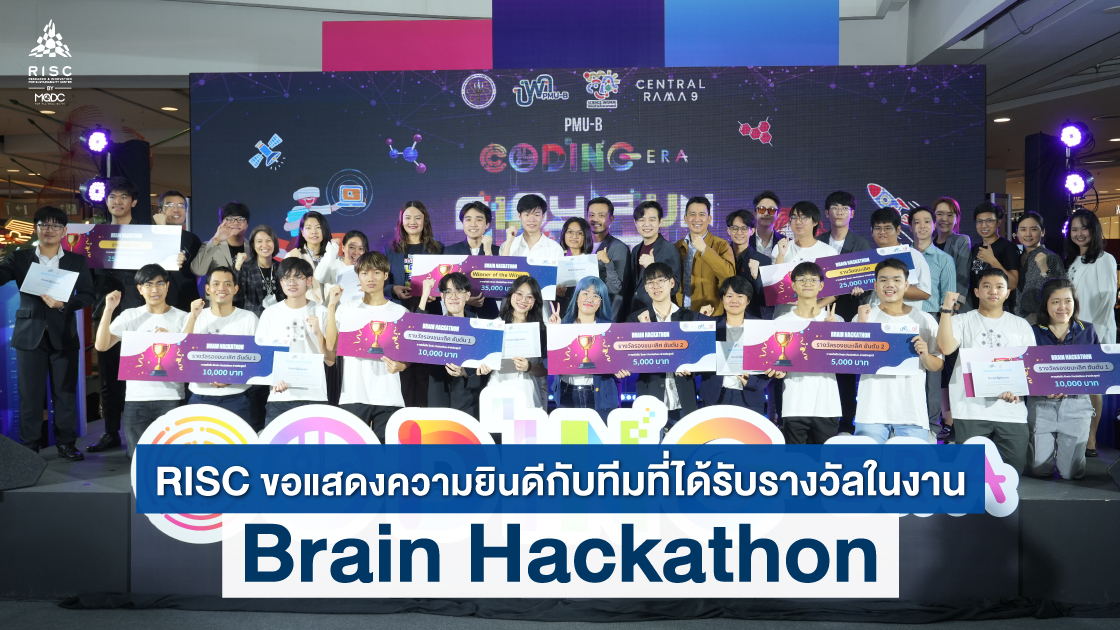ข่าวสาร

Jan 15, 2024 INNOVATION
RISC หนุนสร้างองค์ความรู้ด้านประสาทวิทยาศาสตร์ บ่มเพาะคนรุ่นใหม่ วางรากฐานการต่อยอดนวัตกรรมเพื่อคุณภาพชีวิต สร้างสุขอย่างยั่งยืน
RISC ร่วมเป็นพันธมิตรหลักในงาน Brain Hackathon สนับสนุนการพัฒนาเยาวชนและองค์ความรู้เกี่ยวกับสมองและการรับรู้ ปูทางสู่การพัฒนาปัญญาประดิษฐ์อย่างมีประสิทธิภาพ
14 มกราคม 2567, กรุงเทพฯ – ศูนย์วิจัยและนวัตกรรมเพื่อความยั่งยืน (RISC) ภายใต้ MQDC (บริษัท แมกโนเลีย ควอลิตี้ ดีเวล็อปเม้นต์ คอร์ปอเรชั่น จำกัด) ย้ำจุดยืนส่งเสริมการพัฒนาองค์ความรู้ด้านประสาทวิทยาศาสตร์ (Neuro Science) สร้างความแข็งแกร่งและเครือข่ายบุคลากรคุณภาพเพื่อวางรากฐานที่ดีให้ประเทศไทยก่อนต่อยอดสู่นวัตกรรมปัญญาประดิษฐ์ (AI) ผ่านการสนับสนุนกิจกรรม Brain Hackathon พร้อมแสดงความยินดีกับเยาวชนผู้ชนะ 2 ทีมที่ได้รับการสนับสนุนจาก Mentors ของ RISC ในการนำความรู้ด้านประสาทวิทยาศาสตร์มาประยุกต์เป็นโครงการที่น่าสนใจ
Brain Hackathon เป็นกิจกรรมการประลองแนวคิดและสร้างโปรเจคโดยการนำทักษะด้าน Coding & AI มาประยุกต์กับองค์ความรู้ด้านประสาทวิทยาศาสตร์ (Neuroscience) ภายใต้โครงการพัฒนาความรู้และทักษะเยาวชนระดับมัธยมศึกษา อุดมศึกษาและวัยทำงานที่มีศักยภาพด้านประสาทวิทยาการคำนวณ ด้วยการเปิดโอกาสให้เยาวชนเหล่านี้ได้เรียนรู้เกี่ยวกับประสาทวิทยาศาสตร์ กระบวนการทำงานของสมอง พร้อมพัฒนาทักษะด้าน Coding AI เพื่อสร้างโมเดลถอดรหัสสมอง และเสนอไอเดียที่สามารถพัฒนาเป็นนวัตกรรมต่อไปในอนาคต โครงการนี้ได้รับการสนับสนุนหลักจากหน่วยบริหารและจัดการทุนด้านการพัฒนากำลังคน และทุนด้านการพัฒนาสถาบันอุดมศึกษา การวิจัยและการสร้างนวัตกรรม (บพค.) ภายใต้กองทุนส่งเสริมวิทยาศาสตร์ วิจัยและนวัตกรรม ร่วมกับมหาวิทยาลัยเทคโนโลยีพระจอมเกล้าธนบุรี จุฬาลงกรณ์มหาวิทยาลัย มหาวิทยาลัยมหิดล ศูนย์นาโนเทคโนโลยีแห่งชาติ และพันธมิตรจากภาคธุรกิจ โดย RISC, IDYLLIAS และ MQDC ได้ร่วมงานและเป็นพันธมิตรหลักในงานปีนี้ด้วย
ผู้ที่ได้รับรางวัล Winner of the Winner ได้แก่ “ทีม Wiggling Ganglion” จากสายประยุกต์ กับโปรเจ็ค EREM ที่วัดความเครียดและอารมณ์ของคนในสถานที่ทำงานจากสีหน้าและเสียง และศึกษาว่ามีผลต่อประสิทธิภาพในการทำงานอย่างไร โดยสายประยุกต์ ทีมที่ได้อันดับ 1 มี 2 ทีม คือ “ทีม LIMITLESS” กับโปรเจ็คการใช้กลิ่นลดความเครียด และ “ทีม We Who Remain” กับโปรเจ็ค They Who Speak การใช้เทคโนโลยีช่วยให้ผู้มีความบกพร่องทางการพูดสามารถสื่อสารได้สะดวกขึ้น และสายวิชาการ ทีมที่ได้อันดับ 1 มี 2 ทีมเช่นกัน คือ “ทีม Placeholder” ภายใต้โครงการ NeuroDev กับโปรเจ็คศึกษาความสัมพันธ์ระหว่างสมองกับสมาธิของคนในแต่ละช่วงอายุ และ “ทีมที่ 1” ภายใต้โครงการ DrugDisco กับโปรเจ็ค NMDA Receptor-targeted Drug Screening Framework for Neurological Disease
รศ. ดร. สิงห์ อินทรชูโต หัวหน้าคณะที่ปรึกษา ศูนย์วิจัยและนวัตกรรมเพื่อความยั่งยืน (RISC), MQDC กล่าวว่า “ปัญญาประดิษฐ์หรือ AI คืออนาคตของมนุษย์ แต่องค์ความรู้และคนที่มีความรู้เรื่องนี้ในประเทศไทยยังมีน้อยมาก เราต้องเร่งสร้างความแข็งแกร่งให้ประเทศไทยในด้านนี้เสียก่อน ถ้าเราจะเร่งพัฒนาปัญญาประดิษฐ์โดยไม่เข้าใจปัญญาที่เกิดจากกระบวนการทำงานของสมองตามธรรมชาติ เราจะไม่สามารถสร้าง AI ที่สมบูรณ์ได้ ทุกวันนี้เรามักพูดกันว่าในอนาคต AI จะเข้ามาแทนคน จะมีความสร้างสรรค์และฉลาดมากขึ้น แต่ถ้าวันนี้เราไม่เริ่มสร้างองค์ความรู้และคนจำนวนมากที่เข้าใจการทำงานของสมองจริงๆ เราจะพัฒนา AI ที่มีความสร้างสรรค์ได้อย่างไร และเราจะบ่มเพาะมนุษย์รุ่นใหม่ที่อยู่กับ AI ได้อย่างชาญฉลาดได้อย่างไร
“MQDC ให้ความสำคัญกับ Happiness Science หรือการสร้างความสุขด้วยความรู้ทางวิทยาศาสตร์ ประยุกต์ความรู้กับการสร้างอาคาร เมือง และสิ่งแวดล้อมที่สร้างความสุข ซึ่งต้องอาศัยความเข้าใจความรู้เกี่ยวกับกระบวนการทำงานของสมอง เพราะสมองคืออวัยวะสำคัญที่บอกเราว่าเรามีความสุขหรือไม่ เราจึงให้การสนับสนุนการสร้างองค์ความรู้และระบบนิเวศที่สนับสนุนองค์ความรู้ด้านประสาทวิทยาอย่างจริงจังเช่นการสนับสนุนกิจกรรม Brain Hackathon ครั้งนี้ การบุกเบิกนวัตกรรมเป็นดีเอ็นเอของ MQDC เราพูดเรื่องความเป็นอยู่ที่ดี หรือ Well-Being มาตั้งแต่เมื่อ 20 ปีก่อนในขณะที่สังคมเพิ่งจะเริ่มมาตื่นตัวเรื่องนี้กันในปัจจุบัน MQDC จึงได้ใช้งบประมาณ 2% ของรายได้เพื่อลงทุนด้านการวิจัยและสร้างนวัตกรรม รวมถึงการช่วยเหลือสังคม จะเห็นได้ว่า MQDC มุ่งมั่นปูรากฐานที่แข็งแกร่งให้สังคมไทยตลอดทั้งกระบวนการตั้งแต่การสร้างองค์ความรู้ การพัฒนา ไปจนการนำไปใช้ได้จริงอย่างที่เห็นในโครงการต่างๆ ของเรา” ดร.สิงห์กล่าวย้ำ
กิจกรรม Brain Hackathon เริ่มขึ้นตั้งแต่เดือนพฤศจิกายน 2566 มีนักเรียนนักศึกษาระดับมัธยมปลาย อุดมศึกษา และผู้ที่สนใจจากทั่วประเทศเข้าร่วมโครงการประมาณกว่า 300 คน และถูกคัดรอบแรกให้เหลือ 100 คน โดย แบ่งเป็น 15 ทีม ผูู้เข้าร่วมทั้งหมดได้รับโจทย์ทั้งจากพันธมิตรภาครัฐและเอกชนของโครงการ โดยแบ่งเป็นโจทย์สายวิชาการและสายประยุกต์ หลังจากนั้น ผู้เข้าร่วมโครงการจะได้มีโอกาสเรียนรู้เกี่ยวกับกระบวนการทำงานของสมอง ซึ่งเป็นความรู้พื้นฐานที่แต่ละทีมจะต้องไปต้องถอดรหัสสมอง วิเคราะห์สัญญาณคลื่นสมองและพฤติกรรม เพื่อสร้างโมเดลที่จะต่อยอดไปเป็นนวัตกรรมเพื่อสร้างคุณภาพชีวิตอย่างยั่งยืนและมีความสุข โจทย์ตัวอย่างเช่น การพัฒนานวัตกรรมที่เรียนรู้และปรับอารมณ์ของผู้อยู่อาศัยในบ้านเพื่อสุขภาพใจที่ดี หรือการควบคุมสภาพแวดล้อมเพื่อลดแนวโน้มความเจ็บป่วยทางกายและใจ หรือการสร้างนวัตกรรมที่จะช่วยบำบัดผู้ป่วยที่มีข้อจำกัดในการเคลื่อนไหวร่างกาย (BCI-based assistive tools for disabilities) เป็นต้น
โดยระหว่างการเข้าร่วมโครงการ ผู้เข้าร่วมโครงการได้มีโอกาสรับฟังการบรรยายจากผู้เชี่ยวชาญระดับประเทศและระดับนานาชาติ อาทิ ศาสตราจารย์ ดร. Konrad Kording จาก ภาควิชาประสาทวิทยาศาสตร์และวิศวกรรมชีวภาพ Pennsylvania University ซึ่งเป็นผู้ร่วมก่อตั้ง Neuromatch Academy รวมถึงการบรรยายจากอาจารย์ที่ปรึกษาของ RISC 2 ท่าน คือ รศ. ดร. ยศชนัน วงศ์สวัสดิ์ และ ผศ. ดร. ศิรวัจน์ อิทธิภูริพัฒน์ ในหัวข้อ “BCI and Society” และ “Decoding Brain Signals using Machine Learning” ตามลำดับ อีกทั้งสมาชิกทีมวิจัยของ RISC ที่นำโดย ดร.สฤกกา พงษ์สุวรรณ ผู้อำนวยการฝ่ายบูรณาการงานวิจัยเพื่อการเผยแพร่ และหัวหน้า Happiness Science Hub, RISC ยังได้มานำเสนอผลงานวิจัยในหัวข้อ “Using Neurotechnology to Study the Environmental Effect on Stress and Mental Well-Being” และคุณณัฐภัทร ตันจริยภรณ์ นักวิจัยอาวุโส, RISC ได้นำเสนองานวิจัยเกี่ยวกับปฏิบัติการเชื่อมต่อสมองกับคอมพิวเตอร์ ในหัวข้อ “Computational Neuroscience and BCI Applications”
นอกจากนี้ ยังได้จัดในเวิร์คช็อปสร้างประสบการณ์เกี่ยวกับการรับรู้ของสมอง และการวัดสัญญาณสมอง การใช้เทคโนโลยีด้าน VR และการใช้ปัญญาประดิษฐ์ เพื่อทำงานวิจัยและสร้างนวัตกรรมทางด้านประสาทวิทยาศาสตร์ เพื่อใช้ตอบโจทย์ด้านการแพทย์ การศึกษา และธุรกิจ เป็นต้น โดยผู้ที่ร่วมโครงการได้เข้าเวิร์คช็อปที่ห้องปฏิบัติการ Happiness Science ณ สำนักงานใหญ่ DTGO CampUs ในกิจกรรม "Neuroworkshop: Eye-tracking Workshop with VR and Illusion Experiment โดยทีมนักวิจัย RISC, MQDC“ และ "Neuroworkshop: AI Influencer โดยทีมงาน IDYLLIAS, MQDC“ ซึ่งผู้เข้าร่วมโครงการได้ทำการทดลองเกี่ยวกับการรับรู้ เช่น Eye-tracking system ที่สามารถนำมาใช้ในการสร้างความสนใจผ่านการมองเห็น Illusion Workshop การทดสอบการรับรู้และการประมวลผลของสมองจากภาพลวงตา และการใช้ VR ทดสอบความเปลี่ยนแปลงสภาพแวดล้อมที่มีผลต่อการรับรู้
ผศ. ดร.ศิรวัจน์ อิทธิภูริพัฒน์ หัวหน้าศูนย์วิจัยและนวัตกรรมประสาทวิทยาศาสตร์ สถาบันการเรียนรู้ มหาวิทยาลัยเทคโนโลยีพระจอมเกล้าธนบุรีในฐานะหัวหน้าโครงการ Brain Hackathon กล่าวว่า “โครงการ Brain Hackathon ในปีแรกนี้ถือว่าประสบความสำเร็จตามคาด น้องๆ ในสายวิชาการเอง มีศักยภาพด้านการวิจัยมีความสามารถพอที่จะเข้าร่วมการประชุมวิชาการระดับนานาชาติได้เลย ส่วนสายประยุกต์ก็มีวิสัยทัศน์ มีไอเดียน่าสนใจ โครงการนี้คือจุดเริ่มต้นของการสร้างองค์ประกอบพื้นฐานที่จะส่งเสริมให้เกิดการสร้างองค์ความรู้ใหม่ๆ ได้แก่ คนที่มีความรู้ มีวิสัยทัศน์กว้างไกล สามารถนำความรู้เกี่ยวกับสมองมาประยุกต์ใช้ได้ มีศักยภาพที่จะศึกษาเกี่ยวกับสมองให้ลึกซึ้งมากขึ้น สามารถบริหารจัดการโครงการและงานของตนเองได้เป็นอย่างดี นอกจากนี้ยังเป็นการสร้างเครือข่ายผู้รู้ที่กว้างขวางซึ่งจะต่อยอดไปสู่การแลกเปลี่ยนความรู้ความร่วมมือสร้างสรรค์นวัตกรรมในอนาคต”
ทีมที่ RISC เป็น Mentor ทั้งสองทีม ได้แก่ ทีม “งูพันลิงขี่กระบือ” ซึ่งศึกษาความสัมพันธ์ระหว่างพื้นที่สีเขียวป่าและการดูดซับหรือลดมลภาวะทางอากาศภายในเมือง เนื่องจากมลภาวะเป็นสาเหตุสำคัญอันหนึ่งที่ทำให้เกิดโรคสมองเสื่อมจากหลอดเลือด (Vascular Dementia) ซึ่งมีแนวโน้มเพิ่มมากขึ้น การใช้พื้นที่สีเขียวและป่าเพื่อช่วยให้คนมีความเป็นอยู่ที่ดีขึ้น ลดความเสี่ยงต่อโรคสมองเสื่อมจากหลอดเลือดสมองได้ และทีม “LIMITLESS” ซึ่งนำความรู้เกี่ยวกับการรับรู้ของสมองมาสร้างกลิ่นภายในอาคาร โดยใช้เซนเซอร์และ IOT ในการวัดระดับความเครียดของคนก่อนจะสั่งให้ระบบปล่อยกลิ่นหอมที่ช่วยลดความเครียด นอนหลับง่ายขึ้น เพิ่มความสุขในการอยู่อาศัย
“ในโครงการ Brain Hackathon เราได้เรียนรู้กระบวนการครบทั้งหมด ตั้งแต่การเรียนรู้เรื่องสมอง การนำไปใช้ในการสร้างสุขภาวะและการเป็นอยู่ที่ดี ทักษะด้านเทคโนโลยี และได้นำความรู้เหล่านี้มาผสมผสานกันสร้างเป็นโครงการที่เราจับต้องได้ และได้เรียนรู้จากคนเก่งๆ ที่ทำงานด้านนี้โดยตรง เป็นประโยชน์มาก” ทีมงูพันลิงขี่กระบือกล่าว
ทีมชนะเลิศ จะได้รับเงินรางวัล 25,000 บาทและเปิดโอกาสให้ฝึกงานกับทีม RISC เพื่อเพิ่มพูนความรู้จากการทำงานวิจัยและต่อยอดนวัตกรรมประยุกต์ใช้จริง นอกจากนี้ ผลงานที่สอดคล้องกับแนวทางการดำเนินงานของ MQDC ในการพัฒนาที่อยู่อาศัย เมืองอัจฉริยะที่มีสภาพแวดล้อมส่งเสริมการพัฒนาคุณภาพชีวิตอย่างยั่งยืน มีโอกาสจะได้รับการพัฒนาต่อยอด เพื่อให้เกิดนวัตกรรมที่นำไปสู่การใช้งานจริงในโครงการของ MQDC และส่งต่อนวัตกรรมเพื่อสร้าง Well-Being รูปแบบต่างๆ สู่สังคมในวงกว้างต่อไป
ผู้ที่สนใจสามารถดูข้อมูลเพิ่มเติมเกี่ยวกับผู้ชนะและรายละเอียดโครงการที่เข้ารอบสุดท้ายได้ที่ https://sites.google.com/view/brainhackathon/winner
14 มกราคม 2567, กรุงเทพฯ – ศูนย์วิจัยและนวัตกรรมเพื่อความยั่งยืน (RISC) ภายใต้ MQDC (บริษัท แมกโนเลีย ควอลิตี้ ดีเวล็อปเม้นต์ คอร์ปอเรชั่น จำกัด) ย้ำจุดยืนส่งเสริมการพัฒนาองค์ความรู้ด้านประสาทวิทยาศาสตร์ (Neuro Science) สร้างความแข็งแกร่งและเครือข่ายบุคลากรคุณภาพเพื่อวางรากฐานที่ดีให้ประเทศไทยก่อนต่อยอดสู่นวัตกรรมปัญญาประดิษฐ์ (AI) ผ่านการสนับสนุนกิจกรรม Brain Hackathon พร้อมแสดงความยินดีกับเยาวชนผู้ชนะ 2 ทีมที่ได้รับการสนับสนุนจาก Mentors ของ RISC ในการนำความรู้ด้านประสาทวิทยาศาสตร์มาประยุกต์เป็นโครงการที่น่าสนใจ
Brain Hackathon เป็นกิจกรรมการประลองแนวคิดและสร้างโปรเจคโดยการนำทักษะด้าน Coding & AI มาประยุกต์กับองค์ความรู้ด้านประสาทวิทยาศาสตร์ (Neuroscience) ภายใต้โครงการพัฒนาความรู้และทักษะเยาวชนระดับมัธยมศึกษา อุดมศึกษาและวัยทำงานที่มีศักยภาพด้านประสาทวิทยาการคำนวณ ด้วยการเปิดโอกาสให้เยาวชนเหล่านี้ได้เรียนรู้เกี่ยวกับประสาทวิทยาศาสตร์ กระบวนการทำงานของสมอง พร้อมพัฒนาทักษะด้าน Coding AI เพื่อสร้างโมเดลถอดรหัสสมอง และเสนอไอเดียที่สามารถพัฒนาเป็นนวัตกรรมต่อไปในอนาคต โครงการนี้ได้รับการสนับสนุนหลักจากหน่วยบริหารและจัดการทุนด้านการพัฒนากำลังคน และทุนด้านการพัฒนาสถาบันอุดมศึกษา การวิจัยและการสร้างนวัตกรรม (บพค.) ภายใต้กองทุนส่งเสริมวิทยาศาสตร์ วิจัยและนวัตกรรม ร่วมกับมหาวิทยาลัยเทคโนโลยีพระจอมเกล้าธนบุรี จุฬาลงกรณ์มหาวิทยาลัย มหาวิทยาลัยมหิดล ศูนย์นาโนเทคโนโลยีแห่งชาติ และพันธมิตรจากภาคธุรกิจ โดย RISC, IDYLLIAS และ MQDC ได้ร่วมงานและเป็นพันธมิตรหลักในงานปีนี้ด้วย
ผู้ที่ได้รับรางวัล Winner of the Winner ได้แก่ “ทีม Wiggling Ganglion” จากสายประยุกต์ กับโปรเจ็ค EREM ที่วัดความเครียดและอารมณ์ของคนในสถานที่ทำงานจากสีหน้าและเสียง และศึกษาว่ามีผลต่อประสิทธิภาพในการทำงานอย่างไร โดยสายประยุกต์ ทีมที่ได้อันดับ 1 มี 2 ทีม คือ “ทีม LIMITLESS” กับโปรเจ็คการใช้กลิ่นลดความเครียด และ “ทีม We Who Remain” กับโปรเจ็ค They Who Speak การใช้เทคโนโลยีช่วยให้ผู้มีความบกพร่องทางการพูดสามารถสื่อสารได้สะดวกขึ้น และสายวิชาการ ทีมที่ได้อันดับ 1 มี 2 ทีมเช่นกัน คือ “ทีม Placeholder” ภายใต้โครงการ NeuroDev กับโปรเจ็คศึกษาความสัมพันธ์ระหว่างสมองกับสมาธิของคนในแต่ละช่วงอายุ และ “ทีมที่ 1” ภายใต้โครงการ DrugDisco กับโปรเจ็ค NMDA Receptor-targeted Drug Screening Framework for Neurological Disease
รศ. ดร. สิงห์ อินทรชูโต หัวหน้าคณะที่ปรึกษา ศูนย์วิจัยและนวัตกรรมเพื่อความยั่งยืน (RISC), MQDC กล่าวว่า “ปัญญาประดิษฐ์หรือ AI คืออนาคตของมนุษย์ แต่องค์ความรู้และคนที่มีความรู้เรื่องนี้ในประเทศไทยยังมีน้อยมาก เราต้องเร่งสร้างความแข็งแกร่งให้ประเทศไทยในด้านนี้เสียก่อน ถ้าเราจะเร่งพัฒนาปัญญาประดิษฐ์โดยไม่เข้าใจปัญญาที่เกิดจากกระบวนการทำงานของสมองตามธรรมชาติ เราจะไม่สามารถสร้าง AI ที่สมบูรณ์ได้ ทุกวันนี้เรามักพูดกันว่าในอนาคต AI จะเข้ามาแทนคน จะมีความสร้างสรรค์และฉลาดมากขึ้น แต่ถ้าวันนี้เราไม่เริ่มสร้างองค์ความรู้และคนจำนวนมากที่เข้าใจการทำงานของสมองจริงๆ เราจะพัฒนา AI ที่มีความสร้างสรรค์ได้อย่างไร และเราจะบ่มเพาะมนุษย์รุ่นใหม่ที่อยู่กับ AI ได้อย่างชาญฉลาดได้อย่างไร
“MQDC ให้ความสำคัญกับ Happiness Science หรือการสร้างความสุขด้วยความรู้ทางวิทยาศาสตร์ ประยุกต์ความรู้กับการสร้างอาคาร เมือง และสิ่งแวดล้อมที่สร้างความสุข ซึ่งต้องอาศัยความเข้าใจความรู้เกี่ยวกับกระบวนการทำงานของสมอง เพราะสมองคืออวัยวะสำคัญที่บอกเราว่าเรามีความสุขหรือไม่ เราจึงให้การสนับสนุนการสร้างองค์ความรู้และระบบนิเวศที่สนับสนุนองค์ความรู้ด้านประสาทวิทยาอย่างจริงจังเช่นการสนับสนุนกิจกรรม Brain Hackathon ครั้งนี้ การบุกเบิกนวัตกรรมเป็นดีเอ็นเอของ MQDC เราพูดเรื่องความเป็นอยู่ที่ดี หรือ Well-Being มาตั้งแต่เมื่อ 20 ปีก่อนในขณะที่สังคมเพิ่งจะเริ่มมาตื่นตัวเรื่องนี้กันในปัจจุบัน MQDC จึงได้ใช้งบประมาณ 2% ของรายได้เพื่อลงทุนด้านการวิจัยและสร้างนวัตกรรม รวมถึงการช่วยเหลือสังคม จะเห็นได้ว่า MQDC มุ่งมั่นปูรากฐานที่แข็งแกร่งให้สังคมไทยตลอดทั้งกระบวนการตั้งแต่การสร้างองค์ความรู้ การพัฒนา ไปจนการนำไปใช้ได้จริงอย่างที่เห็นในโครงการต่างๆ ของเรา” ดร.สิงห์กล่าวย้ำ
กิจกรรม Brain Hackathon เริ่มขึ้นตั้งแต่เดือนพฤศจิกายน 2566 มีนักเรียนนักศึกษาระดับมัธยมปลาย อุดมศึกษา และผู้ที่สนใจจากทั่วประเทศเข้าร่วมโครงการประมาณกว่า 300 คน และถูกคัดรอบแรกให้เหลือ 100 คน โดย แบ่งเป็น 15 ทีม ผูู้เข้าร่วมทั้งหมดได้รับโจทย์ทั้งจากพันธมิตรภาครัฐและเอกชนของโครงการ โดยแบ่งเป็นโจทย์สายวิชาการและสายประยุกต์ หลังจากนั้น ผู้เข้าร่วมโครงการจะได้มีโอกาสเรียนรู้เกี่ยวกับกระบวนการทำงานของสมอง ซึ่งเป็นความรู้พื้นฐานที่แต่ละทีมจะต้องไปต้องถอดรหัสสมอง วิเคราะห์สัญญาณคลื่นสมองและพฤติกรรม เพื่อสร้างโมเดลที่จะต่อยอดไปเป็นนวัตกรรมเพื่อสร้างคุณภาพชีวิตอย่างยั่งยืนและมีความสุข โจทย์ตัวอย่างเช่น การพัฒนานวัตกรรมที่เรียนรู้และปรับอารมณ์ของผู้อยู่อาศัยในบ้านเพื่อสุขภาพใจที่ดี หรือการควบคุมสภาพแวดล้อมเพื่อลดแนวโน้มความเจ็บป่วยทางกายและใจ หรือการสร้างนวัตกรรมที่จะช่วยบำบัดผู้ป่วยที่มีข้อจำกัดในการเคลื่อนไหวร่างกาย (BCI-based assistive tools for disabilities) เป็นต้น
โดยระหว่างการเข้าร่วมโครงการ ผู้เข้าร่วมโครงการได้มีโอกาสรับฟังการบรรยายจากผู้เชี่ยวชาญระดับประเทศและระดับนานาชาติ อาทิ ศาสตราจารย์ ดร. Konrad Kording จาก ภาควิชาประสาทวิทยาศาสตร์และวิศวกรรมชีวภาพ Pennsylvania University ซึ่งเป็นผู้ร่วมก่อตั้ง Neuromatch Academy รวมถึงการบรรยายจากอาจารย์ที่ปรึกษาของ RISC 2 ท่าน คือ รศ. ดร. ยศชนัน วงศ์สวัสดิ์ และ ผศ. ดร. ศิรวัจน์ อิทธิภูริพัฒน์ ในหัวข้อ “BCI and Society” และ “Decoding Brain Signals using Machine Learning” ตามลำดับ อีกทั้งสมาชิกทีมวิจัยของ RISC ที่นำโดย ดร.สฤกกา พงษ์สุวรรณ ผู้อำนวยการฝ่ายบูรณาการงานวิจัยเพื่อการเผยแพร่ และหัวหน้า Happiness Science Hub, RISC ยังได้มานำเสนอผลงานวิจัยในหัวข้อ “Using Neurotechnology to Study the Environmental Effect on Stress and Mental Well-Being” และคุณณัฐภัทร ตันจริยภรณ์ นักวิจัยอาวุโส, RISC ได้นำเสนองานวิจัยเกี่ยวกับปฏิบัติการเชื่อมต่อสมองกับคอมพิวเตอร์ ในหัวข้อ “Computational Neuroscience and BCI Applications”
นอกจากนี้ ยังได้จัดในเวิร์คช็อปสร้างประสบการณ์เกี่ยวกับการรับรู้ของสมอง และการวัดสัญญาณสมอง การใช้เทคโนโลยีด้าน VR และการใช้ปัญญาประดิษฐ์ เพื่อทำงานวิจัยและสร้างนวัตกรรมทางด้านประสาทวิทยาศาสตร์ เพื่อใช้ตอบโจทย์ด้านการแพทย์ การศึกษา และธุรกิจ เป็นต้น โดยผู้ที่ร่วมโครงการได้เข้าเวิร์คช็อปที่ห้องปฏิบัติการ Happiness Science ณ สำนักงานใหญ่ DTGO CampUs ในกิจกรรม "Neuroworkshop: Eye-tracking Workshop with VR and Illusion Experiment โดยทีมนักวิจัย RISC, MQDC“ และ "Neuroworkshop: AI Influencer โดยทีมงาน IDYLLIAS, MQDC“ ซึ่งผู้เข้าร่วมโครงการได้ทำการทดลองเกี่ยวกับการรับรู้ เช่น Eye-tracking system ที่สามารถนำมาใช้ในการสร้างความสนใจผ่านการมองเห็น Illusion Workshop การทดสอบการรับรู้และการประมวลผลของสมองจากภาพลวงตา และการใช้ VR ทดสอบความเปลี่ยนแปลงสภาพแวดล้อมที่มีผลต่อการรับรู้
ผศ. ดร.ศิรวัจน์ อิทธิภูริพัฒน์ หัวหน้าศูนย์วิจัยและนวัตกรรมประสาทวิทยาศาสตร์ สถาบันการเรียนรู้ มหาวิทยาลัยเทคโนโลยีพระจอมเกล้าธนบุรีในฐานะหัวหน้าโครงการ Brain Hackathon กล่าวว่า “โครงการ Brain Hackathon ในปีแรกนี้ถือว่าประสบความสำเร็จตามคาด น้องๆ ในสายวิชาการเอง มีศักยภาพด้านการวิจัยมีความสามารถพอที่จะเข้าร่วมการประชุมวิชาการระดับนานาชาติได้เลย ส่วนสายประยุกต์ก็มีวิสัยทัศน์ มีไอเดียน่าสนใจ โครงการนี้คือจุดเริ่มต้นของการสร้างองค์ประกอบพื้นฐานที่จะส่งเสริมให้เกิดการสร้างองค์ความรู้ใหม่ๆ ได้แก่ คนที่มีความรู้ มีวิสัยทัศน์กว้างไกล สามารถนำความรู้เกี่ยวกับสมองมาประยุกต์ใช้ได้ มีศักยภาพที่จะศึกษาเกี่ยวกับสมองให้ลึกซึ้งมากขึ้น สามารถบริหารจัดการโครงการและงานของตนเองได้เป็นอย่างดี นอกจากนี้ยังเป็นการสร้างเครือข่ายผู้รู้ที่กว้างขวางซึ่งจะต่อยอดไปสู่การแลกเปลี่ยนความรู้ความร่วมมือสร้างสรรค์นวัตกรรมในอนาคต”
ทีมที่ RISC เป็น Mentor ทั้งสองทีม ได้แก่ ทีม “งูพันลิงขี่กระบือ” ซึ่งศึกษาความสัมพันธ์ระหว่างพื้นที่สีเขียวป่าและการดูดซับหรือลดมลภาวะทางอากาศภายในเมือง เนื่องจากมลภาวะเป็นสาเหตุสำคัญอันหนึ่งที่ทำให้เกิดโรคสมองเสื่อมจากหลอดเลือด (Vascular Dementia) ซึ่งมีแนวโน้มเพิ่มมากขึ้น การใช้พื้นที่สีเขียวและป่าเพื่อช่วยให้คนมีความเป็นอยู่ที่ดีขึ้น ลดความเสี่ยงต่อโรคสมองเสื่อมจากหลอดเลือดสมองได้ และทีม “LIMITLESS” ซึ่งนำความรู้เกี่ยวกับการรับรู้ของสมองมาสร้างกลิ่นภายในอาคาร โดยใช้เซนเซอร์และ IOT ในการวัดระดับความเครียดของคนก่อนจะสั่งให้ระบบปล่อยกลิ่นหอมที่ช่วยลดความเครียด นอนหลับง่ายขึ้น เพิ่มความสุขในการอยู่อาศัย
“ในโครงการ Brain Hackathon เราได้เรียนรู้กระบวนการครบทั้งหมด ตั้งแต่การเรียนรู้เรื่องสมอง การนำไปใช้ในการสร้างสุขภาวะและการเป็นอยู่ที่ดี ทักษะด้านเทคโนโลยี และได้นำความรู้เหล่านี้มาผสมผสานกันสร้างเป็นโครงการที่เราจับต้องได้ และได้เรียนรู้จากคนเก่งๆ ที่ทำงานด้านนี้โดยตรง เป็นประโยชน์มาก” ทีมงูพันลิงขี่กระบือกล่าว
ทีมชนะเลิศ จะได้รับเงินรางวัล 25,000 บาทและเปิดโอกาสให้ฝึกงานกับทีม RISC เพื่อเพิ่มพูนความรู้จากการทำงานวิจัยและต่อยอดนวัตกรรมประยุกต์ใช้จริง นอกจากนี้ ผลงานที่สอดคล้องกับแนวทางการดำเนินงานของ MQDC ในการพัฒนาที่อยู่อาศัย เมืองอัจฉริยะที่มีสภาพแวดล้อมส่งเสริมการพัฒนาคุณภาพชีวิตอย่างยั่งยืน มีโอกาสจะได้รับการพัฒนาต่อยอด เพื่อให้เกิดนวัตกรรมที่นำไปสู่การใช้งานจริงในโครงการของ MQDC และส่งต่อนวัตกรรมเพื่อสร้าง Well-Being รูปแบบต่างๆ สู่สังคมในวงกว้างต่อไป
ผู้ที่สนใจสามารถดูข้อมูลเพิ่มเติมเกี่ยวกับผู้ชนะและรายละเอียดโครงการที่เข้ารอบสุดท้ายได้ที่ https://sites.google.com/view/brainhackathon/winner
ศูนย์วิจัยและนวัตกรรมเพื่อความยั่งยืน (RISC)
บริษัท แมกโนเลีย ควอลิตี้ ดีเวล็อปเม้นต์ คอร์ปอเรชั่น จำกัด
เลขที่ 695 หมู่ที่ 12 ตำบลบางแก้ว อำเภอบางพลี จังหวัดสมุทรปราการ 10540
เวลาทำการ
วันจันทร์ – ศุกร์ | 11.00 – 17.00 น.
แผนที่ที่ตั้ง
ศูนย์บริการข้อมูลลูกค้า
1265
การเป็นสมาชิกของ RISC
ลงชื่อเข้าเป็นสมาชิกฟรี เพื่อรับสิทธิ์ในการใช้สิ่งอำนวยความสะดวกต่างๆ รวมทั้งห้องสมุด Eco-Material
เยี่ยมเยียนเราได้
ตั้งอยู่ที่โครงการมิกซ์ยูสแมกโนเลียส์ ราชดำริ บูเลอวาร์ด เพียงไม่กี่ก้าวจากรถไฟฟ้า
ผู้ผลิตผลิตภัณฑ์เพื่อสิ่งแวดล้อม
หากคุณเป็นผู้จัดทำผลิตภัณฑ์เพื่อสิ่งแวดล้อม เราพร้อมรับฟังไอเดียของคุณ
นักลงทุน และ นักศึกษา
RISC สนับสนุนนักเรียนนักศึกษา และคนรุ่นใหม่ไฟแรงในสาขาวิศวกรรม การออกแบบ และสถาปัตยกรรม